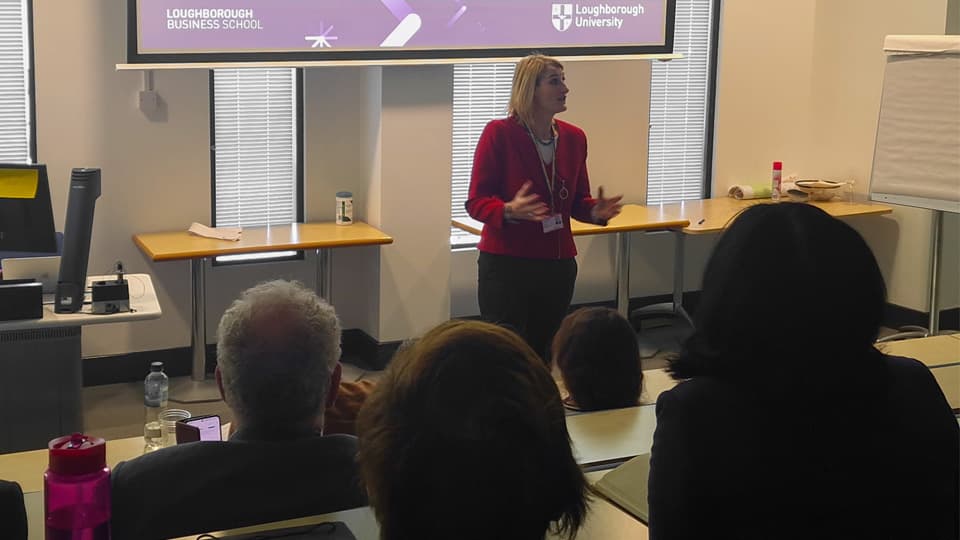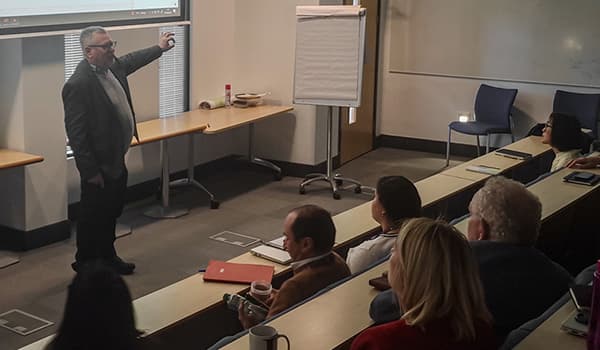Co-organized by the Midlands Research Network for Trade and Investment and Loughborough Business School Economics group, this session welcomed three expert speakers to discuss the broad themes of supply chains and the global economy:
- Supply Chains and the Future of Industries, Professor Jan Godsell, Dean of Loughborough Business School
- Net Zero: A Literature Review on Supply Chain Carbon Emissions and Global Commitments, Dr Huw Edwards, Loughborough Business School
- All Roads Lead to Rome: Global Air Connectivity and Bilateral Trade, Professor Zheng Wang, University of Dundee.
Attendees had the opportunity to learn more about the work that Loughborough Business School academics, and their colleagues at other institutions, are carrying out to expand knowledge and understanding of supply chains.
Discussing her extensive work on the future of supply chains and global manufacturing ecosystems, Professor Jan Godsell said: “When it comes to supply chains, change is the only constant. Organisations are operating in an environment of ever-increasing supply chain volatility, highlighting the essential importance of building effective long-term resilience measures.
“We face broad challenges in terms of the clarity and availability of supply chain data. It is vital that we work with organisations across the supply chain to build trust and move from collaboration or outright competition to a model of ‘co-opetition’, where businesses can share insights for mutual benefit.
“Through the work of projects like the InterAct Network, and our newly established UK SCALE Centre collaboration with MIT, we’re positioning Loughborough Business School as a convener for supply chain stakeholders to create the future they want to see. By envisioning the futures that organisations want to achieve by 2040 through our back casting approach, we can help them take practical steps to improve sustainability, resilience, productivity and workforce satisfaction.”
Dr Huw Edwards added: “We were delighted to receive funding from the Midlands Regional Productivity Forum to pursue research into the areas of emissions trading and carbon accounting. Supply chains account for a huge part of global carbon emissions and form an integral part of any strategy towards achieving national net zero commitments.
“By effectively understanding how countries are measuring their outputs and the impact on policy design and implementation, we can help to shape positive progress. Our systematic literature review represents a good first step towards that goal, which we’re keen to explore further.”
Attendees also heard from Professor Zheng Wang, who outlined his team’s work on the impact of direct air connections between countries and their relative trade relationships. Professor Wang examined the role of in-person communication in international trade, emphasising its enduring relevance despite advances in digital technology.
Professor Wang said: “While digital tools have become more accessible, the demand for business travel remains strong, highlighting the importance of face-to-face interactions in fostering trade relationships.
“In the face of external turmoil like tariff wars, improving air connectivity can act as a buffer, helping countries to maintain and even expand trade relationships.
“Our findings imply that investing in robust connectivity infrastructure is not just about facilitating travel; it's a strategic move to strengthen economic resilience. By enhancing connectivity, countries can mitigate the negative impacts of trade disruptions and foster stronger, more adaptable trade networks.”
Learn more about Loughborough University’s supply chain expertise, teaching and research, visit our UK SCALE Centre website.

